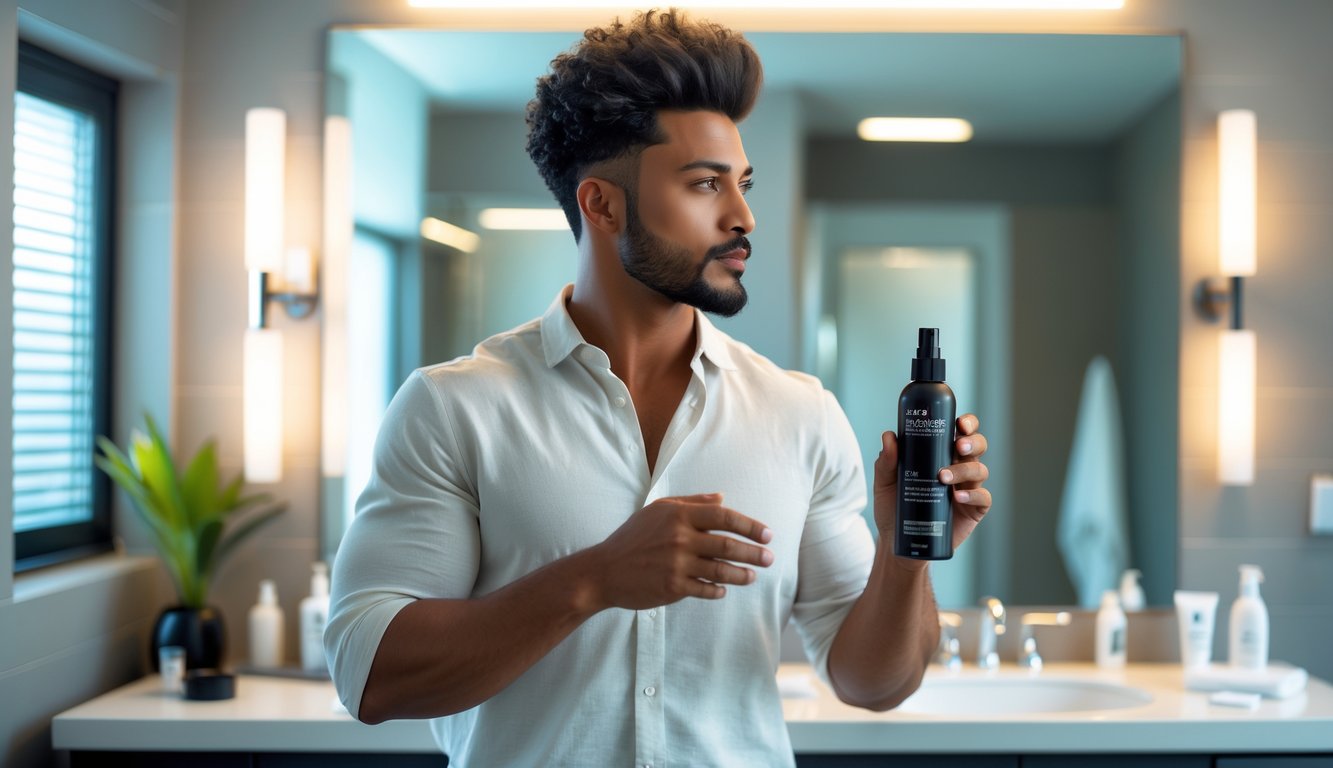
Comparing Hair Thickening Sprays to Other Solutions
Half the time I’m shaking the can, praying it doesn’t glue my hair into a helmet, and the rest of the time I’m just staring at a shelf of “volumizers” thinking, “Do any of you actually do anything?” Sometimes you get instant poof. Sometimes you just get sticky hair. There’s spray, mousse, and—who invented this—tiny hair fibers that somehow end up everywhere except where you want them. Every dermatologist says, “Technique matters.” I still have no idea what that means.
Differences from Hair Fibers and Mousses
Hair fibers? I can’t. They cling to your head like dryer lint and make a mess if you even think about wind. Sprays are more “close your eyes and hope for the best.” The most hyped men’s thickening sprays, like the ones Good Housekeeping likes, just coat your hair with polymers. Mousses? They’re fluffy, but not always “thicker”—sometimes it’s just…big hair.
I’ve had fibers stain my shirt collar. Not a good look at work. Mousses dry flaky on me. Sprays usually dry clean, unless it’s loaded with alcohol (which, yeah, can torch your scalp if you’re sensitive). Dr. Shereene Idriss once told me, “Residue matters. Fibers build up, sprays rinse out.” I wish they made hair products as easy as toothpaste.
How Sprays Fit into Broader Thinning Hair Strategies
Here’s the brutal truth: no spray, not even the Raincry Daily Densifying Treatment, is magic. You’re just faking it for the mirror. None of these sprays grow hair, not even a little. Every dermatologist I’ve ever met says sprays are for camouflage, not cure. If you want real results, you need minoxidil, maybe microneedling if you’re patient, and a reality check about stress.
I’ve caught myself spraying twice a day before realizing I’m just hiding the problem. These bottles promise miracles, but if you’re not careful, you’ll end up with clogged follicles and a cranky scalp. A trichologist once muttered, “Overuse blocks follicles—hurts growth.” I switch up my products and strip down my routine a lot.
People online still ask if thickening spray is all you need, as if diet and DHT-blockers don’t exist. They do. And those ads showing thick hair after one spritz? Lies. I’ve never had a can last through a month of meetings without help from a bunch of other stuff.
Understanding the Science Behind Hair Thickening Sprays
Honestly, what drives me nuts is how these products promise “instant confidence”—like I’m going to spray away a decade of stress. I get it, we all want quick fixes, but dermatologists are clear: the science is way less sexy than the commercials. Ingredients interact with your hair, your scalp, your styling habits, and it’s all a lot messier than the ads admit.
How These Sprays Interact with Hair and Scalp
I can’t forget the first time my hair went from limp to…well, weirdly stiff after a few sprays. It looked thicker, sure, but it felt like plastic grass. It’s all polymers and resins—polyquaternium, PVP, whatever—wrapping each strand to fake fullness. Dr. Amanda Doyle told me, “It’s all illusion. No growth. All temporary.”
But I always forget: those coatings pile up. Skip a wash or two and suddenly your scalp’s itchy, greasy, and just plain mad. Nobody mentions that in the ads. Fortes Clinic breaks down the illusion. Not glamorous, but true.
Evidence Backing Effectiveness
Do these sprays actually work? Kind of? It’s gray. Wimpole Clinic says you get visible volume pretty quick, but don’t expect it to fix thinning. Good Housekeeping’s 2024 test looked at thousands of data points—most sprays just make hair look thicker with cosmetic polymers. Not stronger, not healthier.
Dermatologists nod along: it’s a visual trick, not a cure. Nobody’s tracking regrowth, just how the hair reflects light. And the residue? Some guys complain about gunk, and yeah, I’ve seen it—daily use messes with scalp oils. That’s the real warning, not the miracle claims.
User Experiences and Reviews
Let’s skip the boring intros. Every time I get lost in product reviews for thickening sprays, it’s not just marketers hyping nonsense. There’s brutally honest, sometimes hilarious feedback: guys chasing thicker hair end up with sticky hands, weird residue, or—rarely—a surprise “wow” moment. Nobody warns you about the urge to keep touching your hair like it’s suddenly become a fuzzy hat.
Real Results from Male Users
Do these sprays deliver? Sometimes. Guys in my clinic—mid-30s, fighting the receding tide—came back shocked by formulas with biotin, caffeine, or keratin. One dude said his “before” was “molting bird,” “after” was “padded seat.” Dumb, but, yeah, the best-reviewed sprays do give a visible lift, at least on short, thin hair.
I watched two guys argue over Toppik vs. Boldify—both swore their roots looked denser, until sweat ruined everything by noon. Dr. Li told me, “Daily use can boost the effect, especially with scalp massage.” Try massaging your scalp in a public bathroom, see how that feels.
What nobody mentions: your hair feels like it’s wearing armor. Weird, but true. Still, in every “photo update” these guys posted, hair looked fuller. No clinical metrics, just selfies.
Common Complaints and Praises
The most common complaint? Crunchy hair. One guy said he lost “all head mobility” for hours. Scent is a battlefield too—Boldify’s citrus almost got a memo sent around my office. Still, a bunch of guys fixate on two things: they want less shedding, and they want it yesterday. Patience? Nobody has it.
Some guys act like these sprays are magic: “Covered my scalp better than powder,” then grumble about flakes or stickiness. Good Housekeeping testers found that comfort and texture matter more than instant volume. Someone with super-fine hair said the spray failed in humidity (Houston: total disaster). Others blamed their pillow for killing the effect. Results come and go, but the “confidence boost” is weirdly real—unless it’s all in our heads, which, honestly, could be true.



